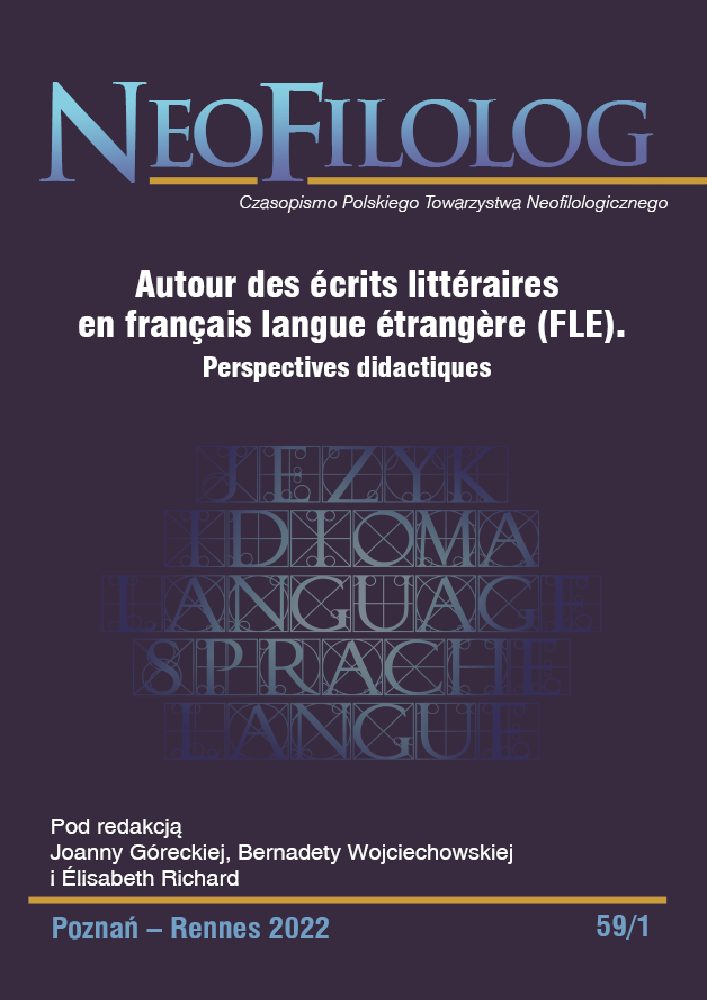Abstract
This article focuses on the use of literary text in a university context, within a curriculum that prepares future translators and interpreters. The author proposes to reflect on the role of language-dominant literary reading where the literary text can be approached as a linguistic object, an object of wonder and of self-expression. The first two roles are demonstrated in chapter 17 of the novel L’embrasure (2010) by the French-Swiss author D. Loup. The last role, self-expression, is the subject of the analysis of two collections of texts Et, si on faisait un livre ... (2019) and Amoureux des mots (2020), a joint writing project by the author and her students.
References
Aristote, Métaphysiques. Livre A, I,1. Paris : Librairie Philosophique Vrin (2000).
Baudelaire Ch. (1869), Petits poèmes en prose. Paris : Michel Lévy.
Bemporad Ch. (2014), Lectures et plaisirs : pour une reconceptualisation des modes et des types de lecture littéraire. « Études de lettres », n° 1, 65-84. En ligne : http://journals.openedition.org/edl/610 [consulté 18.08.2021]. https://doi.org/10.4000/edl.610
Bemporad Ch., Jeanneret T. (dir.) (2019), Lecture de la littérature et appropria-tion des langues et cultures. « Le français dans le monde. Recherches et applications », n° 65, Paris : CLE international.
Charaudeau P. (2019), Grammaire du sens et de l'expression. Limoges : Lam-bert-Lucas.
David J. (2011), Le premier degré de la littérature. « Fabula-LhT », n° 9. En ligne : http://www.fabula.org/lht/9/david.html [consulté 18.08.2021].
De Singly F. (1993), Le livre et la construction de l'identité, (in :) Chaudron M., De Singly F. (dir.), Identité, lecture, écriture. Paris : Centre George Pom-pidou, 131-152.
Gadamer H.-G. (2011), Pravda a metoda II [Vérité et Méthode II]. Praha : Tria-da.
Gervais B. (1992), Les régies de la lecture littéraire. « Tangence », n° 36, 8-18. https://doi.org/10.7202/025707ar
Hadot P. (2002), Exercices spirituels et philosophie antique. Paris : Albin Michel.
Hadot P. (2001), La Philosophie comme manière de vivre. Entretiens avec Jean-nie Carlier et Arnold I. Davidson. Paris : Albin Michel.
Heidegger M. (1993), Básnicky bydlí člověk. Praha: Oikúmené.
Jouve V. (1993), La lecture. Paris : Hachette.
Laurent J. (2011), Platon, Coll. dirigée par Hansen-Løve L., éditions numériques Pierre Hidalgo, La Gaya Scienza. En ligne : https://www.studocu.com/fr/document/universite-de-caen-normandie/philosophie-general e/jerome-laurent-platon-collection-dirigee/6342842 [consulté 10.03.2022]. https://doi.org/10.3917/puf.laure.2011.01.0065
Le Clézio J.M.G. (2008), Dans la forêt des paradoxes. Conférence Nobel, Le 7 décembre 2008. En ligne : https://www.nobelprize.or/uploads/2018/ 06/clezio-lecture_fr-3.pdf] [consulté 23.02.2022].
L'Ecuyer Ch. (2019), Cultiver l'émerveillement et la curiosité naturelle de nos enfants. Paris : Éditions Eyrolles.
Loup, D. (2010), L'embrasure. Paris : Mercure de France.
Orsenna E. (2008), La Chanson de Charles Quint. Vanves : STOCK edition.
Puchovská Z. (dir.) (2019), Et, si on faisait un livre …. Bratislava : Univerzita Ko-menského v Bratislave.
Puchovská Z. (dir.) (2021), Amoureux des mots. Bratislava : Univerzita Ko-menského v Bratislave.
Rouxel A. (2000), Lecture cursive/lecture analytique construire la complémentarité, (in :) Fourtanier M.-J., Langlade G., Rouxel A. (dir.), Recherches en didactique de la littéra-ture. 75-79, Rennes : Presses Universitaires de Rennes.
Rouxel A., Qu'entend-on par lecture littéraire ? (in :) Tauveron C. (dir.), La lec-ture et la culture littéraires au cycle des approfondissements. En ligne : https://media.eduscol.education.fr/file/Formation_continue_enseignan ts/14/7/lecture_culture_litteraires_111147.pdf [consulté 23.02.2022].
Tauveron C. (dir.) (2002), Lire la littérature à l'école. Pourquoi et comment con-duire cet apprentissage spécifique de la GS au CM. ? Paris : Hatier.
Vergely B. (2010), Retour à l'émerveillement. Paris : Albin Michel.
License
Copyright (c) 2022 Neofilolog

This work is licensed under a Creative Commons Attribution-NoDerivatives 4.0 International License.
Authors
Authors of texts accepted for publication in Neofilolog are required to complete, sign and return to the Editorial team’s office the Agreement for granting a royalty-free license to works with a commitment to grant a CC sub-license.
Under the agreement, the authors of the texts published in Neofilolog grant Adam Mickiewicz University in Poznań a non-exclusive, royalty-free license and authorize the use of Attribution-NoDerivatives 4.0 International (CC BY-ND 4.0) Creative Commons sub-license.
The authors retain the right to the free disposal of the work.
Users
Interested Internet users are entitled to use works that have been published in Neofilolog since 2017, under the following conditions:
▪ attribution – obligation to provide, together with the distributed work, information about the authorship, title, source (link to the original work, DOI) and the license itself.
▪ no derivatives – the work must be preserved in its original form. Without the author's consent, it is not possible to distribute the modified work in the form of translations, publications, etc.
Copyrights are reserved for all texts published since 2017.
Miscellaneous
Adam Mickiewicz University in Poznań retains the property right as a whole (layout, graphic form, title, cover design, logo etc.).

